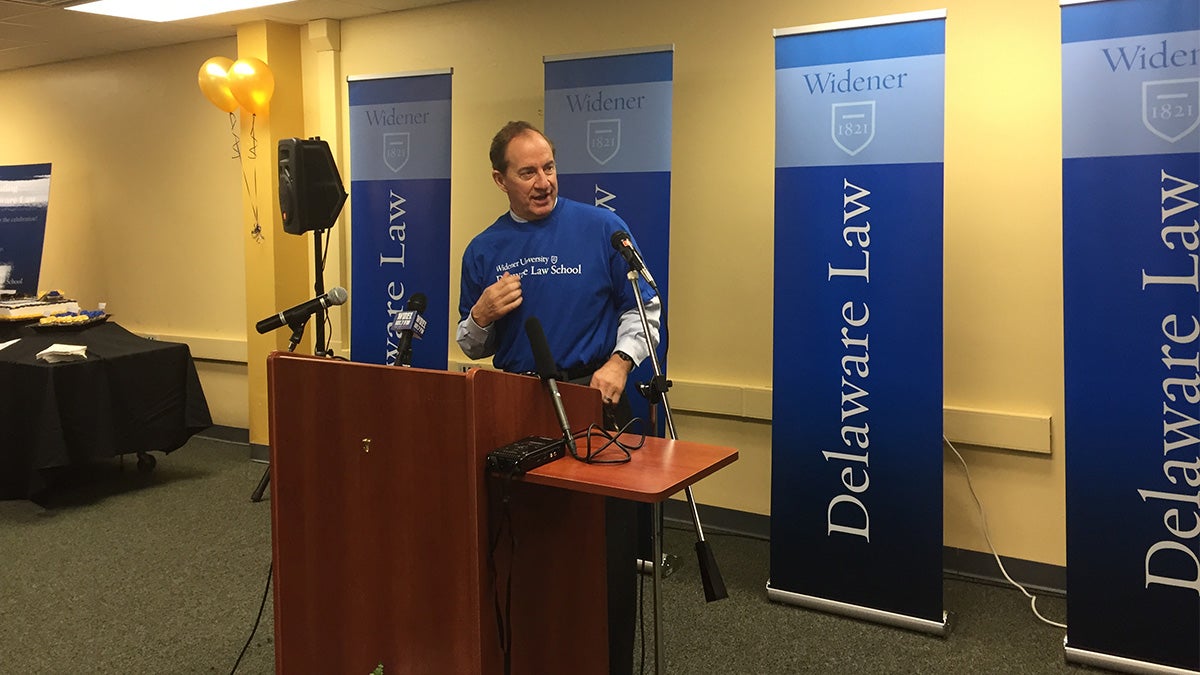Delaware Law School debuts as only law school in state

Incoming Dean Rod Smolla kicked off the debut of the Delaware Law School in Wilmington Wednesday. (Zoë Read/WHYY)
Delaware will have its first law school this fall as Widener University’s Delaware Law School establishes its own identity in the state.
Faculty at Widener University’s law school donned custom made blue t-shirts adorned with a newly designed logo Wednesday defining a new era for the school.
The celebration marked the debut of the Delaware Law School in Wilmington. While still a part of Widener University, the new institute will be its own law school with its own dean, and it will be the only law school in the state.
Incoming Dean, Rod Smolla, kicked off the ceremony on his first day at the university. He said the transition to Delaware Law School will allow faculty to have a connection with the state, its legal system, and the underserved populations of Delaware who need legal services.
“We want to be an asset to the state,” Smolla said. “We want to be something the state and the people of the state look at with a lot of pride.”
The school was formerly known as Widener University School of Law, with campuses in Wilmington and Harrisburg, Pa.
The American Bar Association approved a university plan earlier this year to accredit the campuses separately, creating two individual law schools in the process.
The law program originally opened in the 1970’s as Delaware Law School, but later became affiliated with Widener College, which eventually became Widener University.
In 1989, the university added a campus in Harrisburg. The two campuses offered Widener Law Degrees, but Harrisburg focused on government law while Wilmington focused on corporate law.
Throughout the years, Delaware added programs that included environmental law, veteran law and rights for women who are victims of domestic abuse.
“They’ve always served as two separate law schools,” said James May, distinguished professor of law, and director of the Widener Environmental and Natural Resources Law Institute.
“That campus grew and was terrifically successful and this campus grew and was terrifically successful, but we grew terrifically successfully apart.”
Lawrence Hamermesh, professor of corporate business law at the university, said the transition brings the school back to its roots.
“We’re making more visible what we already have, which is this identity with the State of Delaware,” he said.
“We’re the only law school in the state, and that carries with it a sense of duty to work with the state and its institutions of law. It’s a big mission for us and I think this change aligns more clearly with that mission.”
Third year student Brian Yanos said creating the Delaware Law School will set the students apart from the greater Widener University, and create a stronger community.
“It used to be Widener, and people thought we were part of another campus, but now we are our own separate entity,” he said.
“We are the only law school in Delaware, so it represents the state itself since Delaware is such a small state. It’s a tight community and that reflects on the law school as well.”
Students of the Delaware Law School also will be able to focus more on its signature programs than in the past.
Yanos, who has been studying corporate law, said separating the Delaware campus from the Pennsylvania campus also will help him when he looks for a job.
“It’s good for potential employers to see where we come from,” he said. “They’ll have more familiarity with what we’re doing here and the background we have.”
The school will start classes in the fall with Smolla as its new leader. He previously served as dean of University of Richmond School of Law and Washington and Lee University School of Law, and as president of Furman University in Greenville, S.C.
Smolla has presented oral arguments in state and federal courts throughout the nation, including the U.S. Supreme Court. He will teach Constitutional Law this fall.
May, who served as co-chair of the committee that selected the new dean, said Smolla has a strong reputation as a nationally and internationally known scholar.
“He has terrific leadership qualities, he’s been dean at two other law schools and president of a third, he’s been teacher of the year at places he’s taught,” he said. “He’s also argued cases before the United States Supreme Court, and he’s been a terrific public servant.”
Smolla said as dean he will ensure the university has a robust admissions process that attracts high quality and diverse students. He also said he wants to find ways to partner with the community and form alliances with various groups.
“Strengthening ties to the community is very important,” Smolla said.
WHYY is your source for fact-based, in-depth journalism and information. As a nonprofit organization, we rely on financial support from readers like you. Please give today.




